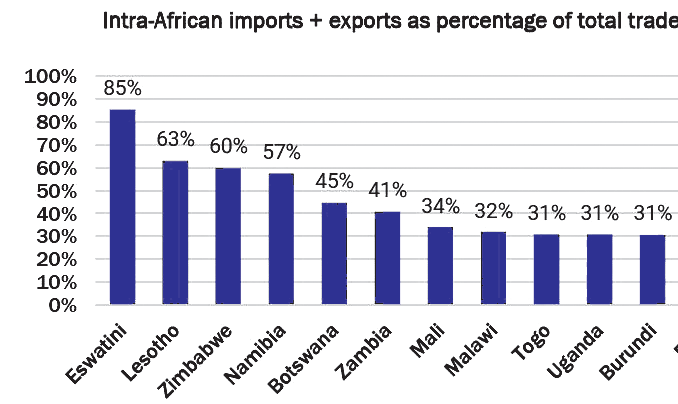Malawi improves trade with Africa
Trade between Malawi and other countries in the African region has improved over the years, with statistics showing that Malawi now accounts for 32 percent of intra-Africa trade, figures shows.
The Brookings Institution Africa Growth Initiative study published this week indicates that at 32 percent, Malawi ranks on position seven out of 13 countries that have improved performance, with Eswatini claiming 85 percent share of intra-Africa trade.

This means that opportunities for Malawians to generate revenues through trade have improved over time, countering a previous narrative and data that the country’s intra-Africa trade is low.
The study, titled ‘Significance of Intra-Africa Trade: Getting the Narrative Right’, which tracks development and progress towards intra-Africa trade, shows that trade between African countries has generally risen and provided a greater economic significance than commonly believed.
Reads the report in part: “The impression of sluggish intra-African trade indicating intra-Africa is minimal at 16 percent over the years has been reviewed.
“Currently, sets of African countries, particularly the smaller, landlocked and more open economies like Malawi have significantly higher levels of dependence on intra-continental trade [imports plus exports] than others thus improving intra-Africa trade.”
The study, however, shows that the African average of intra-regional trade is dragged down by the continent’s larger economies, especially Egypt, Nigeria and to a lesser extent South Africa who claim the highest share of intra-Africa trade.
The report further underscores the importance of the African Continental Free Trade Agreement (AfCFTA) as a key driver of intra-Africa trade growth.
Malawi’s economy is agro-based, with agricultural products dominating the country’s export basket, accounting for about 80 percent of all exports, a development that has disadvantaged the country in terms of trade with its peers.
Speaking in an interview yesterday, Malawi University of Business and Applied Sciences associate professor of economics Betchani Tchereni said Malawi needs to diversify its export products and local production to build on the momentum in growing its trade in the process generating foreign exchange.
He said: “This is evident that we can do more and benefit within the region.
“The trade treaties and policies in place should compel us to trade more with our regional peers and think of diversifying our product portfolio.”
Ministry of Trade and Industry is on record as having said Malawi has potential to tap from a $943 million (K963 billion) export market through the AfCFTA as outlined in the Malawi AfCFTA National Strategy.
The strategy seeks to support the effective implementation of the AfCFTA in Malawi to increase intra-African trade exports and build global trade networks by 2026. The Malawi AfCFTA National Strategy also shows that through the trade agreement, the country has potential to expand its exports market outside the Comesa and Sadc.






One Comment